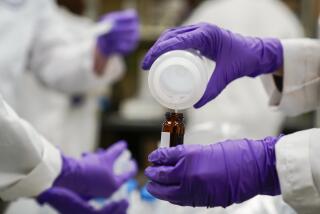Bristol to Settle Investor Lawsuit
- Share via
Bristol-Myers Squibb Co. on Friday said it would pay $300 million to settle a shareholder class-action lawsuit stemming from a sales scheme that inflated profit and from problems in its development of a cancer drug with ImClone Systems Inc.
Bristol-Myers said the amount of the settlement, under which it admitted no wrongdoing, would be paid for from legal reserves of $470 million it had previously set aside.
The settlement, however, does not resolve pending government probes and other private litigation related to the scandal and other legal matters, the company said.
A Manhattan federal judge in April had dismissed the class-action lawsuit, saying no misbehavior by the drug maker had been proven. But the plaintiffs, the Fresno County Employees’ Retirement Assn. and several state pension funds, appealed the decision.
“The case was on appeal and we felt a settlement was now the appropriate course of action,” said a Bristol-Myers spokesman, who declined to elaborate.
Investors first sued Bristol over its experimental colon cancer drug Erbitux, which it was co-developing with ImClone, claiming Bristol misled them about prospects for the drug.
U.S. regulators in December 2001 refused to review the application for Erbitux because of sloppy clinical trial data -- a big setback for the potential blockbuster that sparked a sell-off in shares of Bristol and ImClone. Bristol previously had agreed to pay ImClone up to $2 billion for the right to co-market the medicine and share its profit.
The former chief executive of ImClone, Samuel D. Waksal, was later sent to prison on an insider trading scandal related to Erbitux, but the drug was finally approved this year.
Investors again sued Bristol after the company in April 2002 acknowledged an inventory scam, sending its shares to a four-year low.
Bristol routinely coaxed wholesalers to overstock its drugs from 1999 to 2001 as a means of boosting profit. It said it had boosted sales by $2.5 billion from 1999 to 2001, artificially inflating profit by $900 million. Last year, Bristol restated earnings for the three-year period.
The company said the scheme had allowed it to make good on quarterly sales and earnings projections.
A federal criminal grand jury in Newark, N.J., began probing the inventory scandal this year, according to published reports. The Securities and Exchange Commission is conducting a civil probe of the inventory scheme.
Shares of Bristol-Myers closed up 33 cents to $22.90 on the New York Stock Exchange.
More to Read
Inside the business of entertainment
The Wide Shot brings you news, analysis and insights on everything from streaming wars to production — and what it all means for the future.
You may occasionally receive promotional content from the Los Angeles Times.










